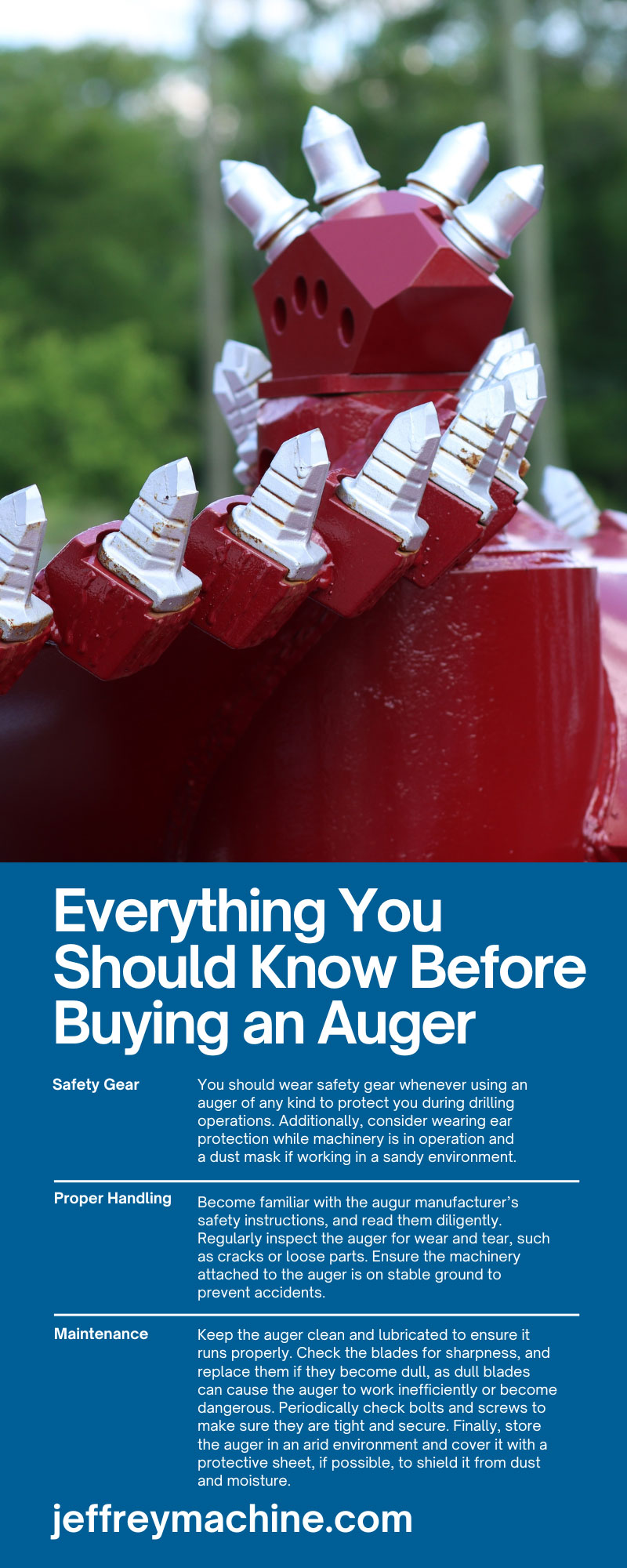Everything You Should Know Before Buying an Auger

There is no spontaneous choice when choosing tools for industrial work. Among these essential tools is the auger. This comprehensive guide will tell you everything you should know before buying an auger.
Reasons You May Need an Auger
Understanding the applications of a drill can help you determine whether it’s a suitable tool for your needs. Here are some reasons you might require an auger:
Efficient Earth Drilling
Augers rapidly drill through the earth, making it suitable for breaking through various soil types. They are indispensable for agricultural, landscaping, and construction projects.
Consistent Hole Sizes
You may need a tool that creates consistent-sized holes. An auger creates uniform holes in size and depth, which is critical for tasks that require precise measurements, such as installing fence posts or planting trees.
The Different Auger Sizes
One of the main considerations before purchasing an auger is the size. Auger sizes vary depending on the diameter and length of the hole you need to drill.
- Small augers (6–8 inches)
- Medium augers (12–16 inches)
- Large augers (18 inches and above)
Different Ground Types and Augers That Work on Them
The type of ground you are working on determines the kind of drill you need. Each auger type works differently in various soil conditions.
Soft Soil/Sand
An auger with a tapered bit is generally sufficient for soft soil like sand. These standard-earth augers penetrate easily without much resistance, making them ideal for landscaping or light-duty digging. They work well in loose, non-cohesive soils where the auger can smoothly cut through and remove the material without clogging or getting stuck.
Clay
Clay soils can be challenging to excavate, so augers with spiral designs are suitable. A spiral-shaped auger cuts through the dense, sticky earth without getting caught in the hole.
Rocky Soil
An auger with reinforced, carbide-tipped blades is necessary for drilling through rocky or compact soil. These tools can withstand firm soil and rocks while making a clean and precise hole. They are ideal for heavy-duty digging tasks where standard augers would become stuck or sustain damage.
Frozen Ground
Using an auger with a high-torque motor and specialized blades that can withstand freezing temperatures is essential for drilling through frozen earth. These tools provide the power to penetrate the hard, frozen ground, while the blades resist the extreme cold. This combination ensures digging in wintry conditions remains possible.
The Uses of Augers
Augers are versatile tools with a range of applications, and understanding them can be the deciding factor in choosing the right auger:
Construction
Augers help a construction crew with many tasks, from creating foundations to digging trenches. Their ability to bore through various soil types makes them incredibly useful in laying the groundwork of a construction project and ensuring buildings and infrastructures stand on stable bases.
Agriculture
Augers are indispensable to modern farming because they help farmers create irrigation systems, streamline the planting process, and set up essential farming infrastructure. Farmers can save time and labor while improving their agricultural activities.
Landscaping
Augers help landscapers design and maintain beautiful environments by boring holes to plant shrubs, trees, and water features. They improve the function and appearance of outdoor environments so workers can install intricate or simple natural features.
Geotechnical Engineering
Augers allow geotechnical engineers to extract soil from various depths for soil sampling and analysis without contamination. This helps engineers find the most suitable sites for construction development. It also helps them verify the ground is stable for drilling.
Safety and Maintenance Considerations
Safety and maintenance are pivotal for the longevity and efficiency of your auger:
Safety Gear
You should wear safety gear whenever using an auger of any kind to protect you during drilling operations. Additionally, consider wearing ear protection while machinery is in operation and a dust mask if working in a sandy environment.
Proper Handling
Become familiar with the augur manufacturer’s safety instructions, and read them diligently. Regularly inspect the auger for wear and tear, such as cracks or loose parts. Ensure the machinery attached to the auger is on stable ground to prevent accidents.
Maintenance
Keep the auger clean and lubricated to ensure it runs properly. Check the blades for sharpness, and replace them if they become dull, as dull blades can cause the auger to work inefficiently or become dangerous. Periodically check bolts and screws to make sure they are tight and secure. Finally, store the auger in an arid environment and cover it with a protective sheet, if possible, to shield it from dust and moisture.
Do You Need Augers?
Choosing the ideal auger can enhance its versatility and performance, depending on how you use it. Here are standard augers to consider.
Extension Shafts
These tools are essential for drilling deep holes. Extension shafts can increase the depth capacity of your tool, making it more versatile for projects requiring extensive drilling work.
Post Hole Diggers
Designed to create uniform holes for fence posts, mailboxes, or signposts, post hole diggers ensure holes are deep and wide enough before placing a sign, fence post, or mailbox.
Mixing Paddles
Used primarily in construction, mixing paddles transform your auger into a powerful mixing tool, making it suitable for blending concrete, mortar, and compost materials.
Why Does This Matter?
We understand the takeaways, but why do they matter, and how do they affect your auger purchase? Picking the right size and type for performance and avoiding delays when inspecting ground conditions leads you to understand why these sections matter in your decision to buy an auger.
The Versatility of Augers
It’s pretty amazing how versatile augers are across so many industries! Whether it’s drilling holes for foundations or making planting holes in landscaping and agriculture, these tools can do it all. Their adaptability means professionals can handle a wide range of tasks.
Safety and Maintenance
Safety and maintenance can demonstrate why a certain type of auger is right for your project. Checking up on the auger daily ensures you can resolve immediate issues without wasting time and money.
Maximizing ROI
In the end, all these points are crucial for maximizing your return on investment (ROI). Construction business owners can boost their operations by taking the time to understand auger versatility, keeping up with maintenance, and prioritizing safety. This all-in approach sets the stage for successful projects, better results, and increased profits down the line.
Buying an Auger With Confidence
Choosing the right auger is crucial for the success of your project. With our guide on what to know before buying an auger, you can make an informed decision that meets your needs.
We’ve got a wide selection of augers at Jeffrey Machine, including our drilling buckets that remove large volumes of sand or soil. Whether you need an auger now or later, we can help you find what you need! Contact our team for sound advice on picking tools that meet your needs.

